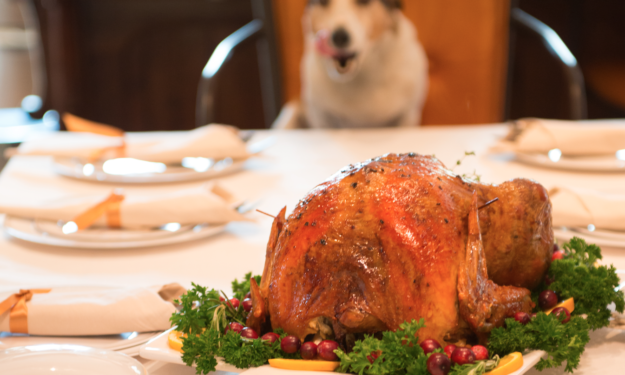7 Thanksgiving Foods That Can Be Dangerous For Your Pets

The day after Thanksgiving is one of the busiest days of the year…for pancreatitis-related vet visits. It’s not the chocolate or the alcohol – it’s human food. Pets are often spoiled on holidays with a sudden surge of high-fat human food including table scraps, treats, leftover meat scrapings, and food fallen onto the floor. Here’s a list of the foods you should avoid giving to your pets this Thanksgiving to keep them out of the emergency room:
#1: Fatty Foods
Fatty foods aren’t toxic to animals, but they can cause vomiting, diarrhea, gas, abdominal pain, and in worse cases, pancreatitis (inflammation of the pancreas) or GI issues. Symptoms may take a few days to present themselves. Some dog breeds are more susceptible to pancreatitis including Miniature Schnauzers, Miniature Poodles, and Cocker Spaniels. Fatty Thanksgiving foods to avoid sharing include:
- Gravy
- Turkey & skin (if cooked with oils, butter, seasonings, etc.)
- Pies (apple pie, pecan pie, etc.)
- Mashed potatoes
- Bread pudding
- Mac n’ cheese
- Bacon
- Butter
- Meat drippings & scraps
- Anything with Macadamia nuts
#2: Stuffing
Speaking of fatty foods, stuffing is also high on the “no” list for pets. Not only is it high in fat, but it can also contain multiple ingredients which are toxic to animals: onions, garlic, chives, and pepper. Onions contain an ingredient called thiosulphate which can cause hemolytic anemia (damage to red blood cells) in pets. For this reason, other foods using onions such as gravy, basted turkey skin, and casseroles shouldn’t be given to dogs or cats either.
#3: Turkey Brine
If you have jumped on the recent trend of brining your turkey before cooking it, the turkey comes out of the oven with a salt-saturated solution that smells scrumptious to cats and dogs (and humans). This high sodium content can cause salt poisoning in pets. More information on salt poisoning is available here.
#4: Pumpkin Pie
Though plain canned pumpkin can be a healthful treat for pets, sugar-filled pumpkin pie filling is not. Additionally, nutmeg contains a toxin called myristicin, which can cause stomach upset in pets and in large amounts can cause additional severe symptoms.
#5: Discarded Foods
Keep your trash inaccessible and sealed tight – even the best behaved pet can be lured into bad trash etiquette around Thanksgiving. Also keep an eye on the table and counter tops piled high with food and scraps, because you know they are. If your pet grabs a discarded corn cob, turkey trussing, or turkey bone, they are likely to swallow it whole as quick as they can, this can cause a risk for choking, obstruction or a GI injury. If a corn cob or bone gets stuck, or causes internal damage, a surgical or endoscopic removal may be the only option to prevent further damage.
#6: Dark Chocolate Desserts
Most pet owners know that chocolate is toxic to dogs, but did you know it only takes a very small amount of Bakers chocolate or cocoa powder to cause severe toxicity? If you’re baking sweet treats, keep the baking chocolate (or your pet) far, far away. If family members are bringing dark chocolate cakes, brownies, cookies, fudge, dipped fruit, or pies, make sure that pieces aren’t getting accidentally dropped on the floor and quickly gobbled up by your dog. It only takes a few ounces of dark chocolate to cause toxicity, and even less for baking chocolate.
To calculate your dog’s toxicity, you can use this toxicity meter.
#7: Nuts & Raisins
Nuts, found in many Thanksgiving pies, breads, and platters, are another fatty food that poses a risk of pancreatitis in dogs. Macadamia nuts are more serious, as ingestions can result in more dangerous consequences. Raisins, often found in pie, stuffing, casseroles, and salads, can cause acute (sudden) renal failure in some dogs as well.
Symptoms to watch out for post-Thanksgiving:
-
- Vomiting and/or diarrhea that does not resolve itself over 2 days, or is in conjunction with other symptoms below.
- Increased thirst & urination
- Lethargy
- Disorientation, inability to rise or walk normally (drunken appearance)
- Agitation or restlessness
- Tremors
- Increased heart rate
- Straining to defecate
- Whimpering or discomfort
- Loss of appetite/unwillingness to eat.
If you are worried about your dog or cat finding a plate of food, eating fallen scraps off the floor, or family members who are too generous in sharing their dinner, keep your pet confined in a separate room or boarded in a kennel over the holiday. An ounce of prevention is worth a pound of cure.
If you think your pet has eaten something, or if they present any of the above symptoms over the holiday, bring them to the nearest ER. Time counts in these situations. Though you may want to try to investigate or monitor them before rushing to the car, remember toxicity can happen quickly and severely in pets.
Written by RACHAEL GILLIS